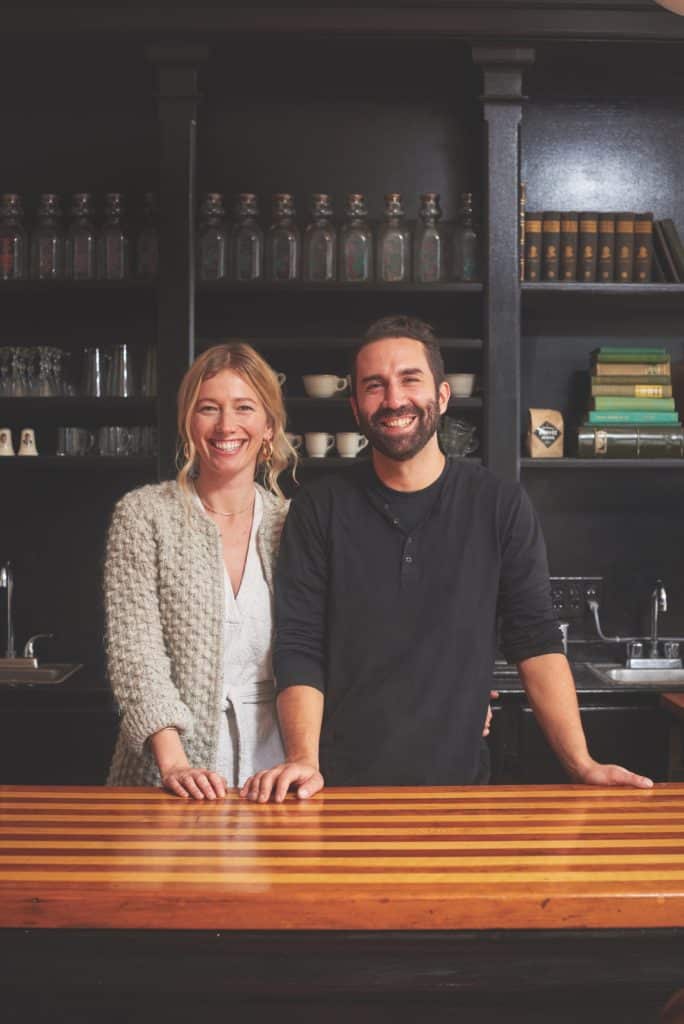
Brushland Eating House, NY. Owners Sara Elbert and Sohail Zandi standing at the bar. Photo by Jennifer May. www.jennifermay.com
Sohail Zandi, the 34-year-old chef and co-owner of Brushland Eating House in Bovina, N.Y., did not attend culinary school. Instead, he earned a bachelor’s degree in biology and attended graduate school for political science. But in between classes, he struck up a side hustle in New York City’s restaurant world.
Zandi worked in a variety of locations, including well-known Brooklyn eateries like The Grocery and Prime Meats. And in 2013, when he decided to “get rid of” all his things and move to Martha’s Vineyard, it wasn’t biology or political science that drew him—it was food. More specifically, it was cheese. “I had a need for space, to start something of my own, and to disconnect from the city for a while,” Zandi says. “The idea of simplifying life, giving myself space to clear my head and focus, was really alluring.”
He was hired as an assistant cheesemaker for The Grey Barn, an organic dairy farm and creamery on the island. In exchange, he was provided with housing and a paycheck of $300 to $400 a week. “People romanticize most things, and I did that with the cheesemaking before I arrived. And it was sort of romantic—it was an extremely bucolic place with great people. But it was also hard work.”
For Zandi, though, it was worth it. Cheese was a way to link his love of science and food. “I always wanted to do something agricultural, and I felt like [cheesemaking] was a melding of all the worlds I wanted to be a part of,” he says.
In February 2014, Zandi took another leap, partnering with his then-girlfriend (now wife), Sara Elbert, to buy a restaurant in Bovina, N.Y. The historic space once served as a post office and a haberdashery, but was restored in the 1990s and has been an eatery ever since. When it went up for sale, they took it as a sign and “dove in head first,” he says.

Brushland Eating House, NY. Photo by Jennifer May. www.jennifermay.com
Although neither Zandi nor Elbert hails from Bovina, a lush town in Delaware County with a population of about 600, they had been toying with the idea of moving to the Catskills ever since their first visit. “We knew we wanted to end up here, but didn’t know in what capacity,” Zandi says. “It was a gut feeling, much like falling in love. We didn’t do much research outside of visiting and spending time in the mountains.”
The process of opening their own restaurant turned out to be surprisingly smooth. “We had a plan in place and very little went astray,” Zandi says. “We were very lucky. I kept telling people I was waiting for something to go wrong, but things just kept working out the way we imagined.”
Thanks to the aforementioned structural renovations, the only work Zandi and Elbert had to do was cosmetic. They painted the existing woodwork, hung new light fixtures, and brought in new tables and seating. The couple worked hard to preserve the building’s original charm; even though the shelving, cabinetry, and main bar had to be replaced due to wear, all are replicas of the original design. Brushland Eating House opened in May 2014, just three months after it was purchased.
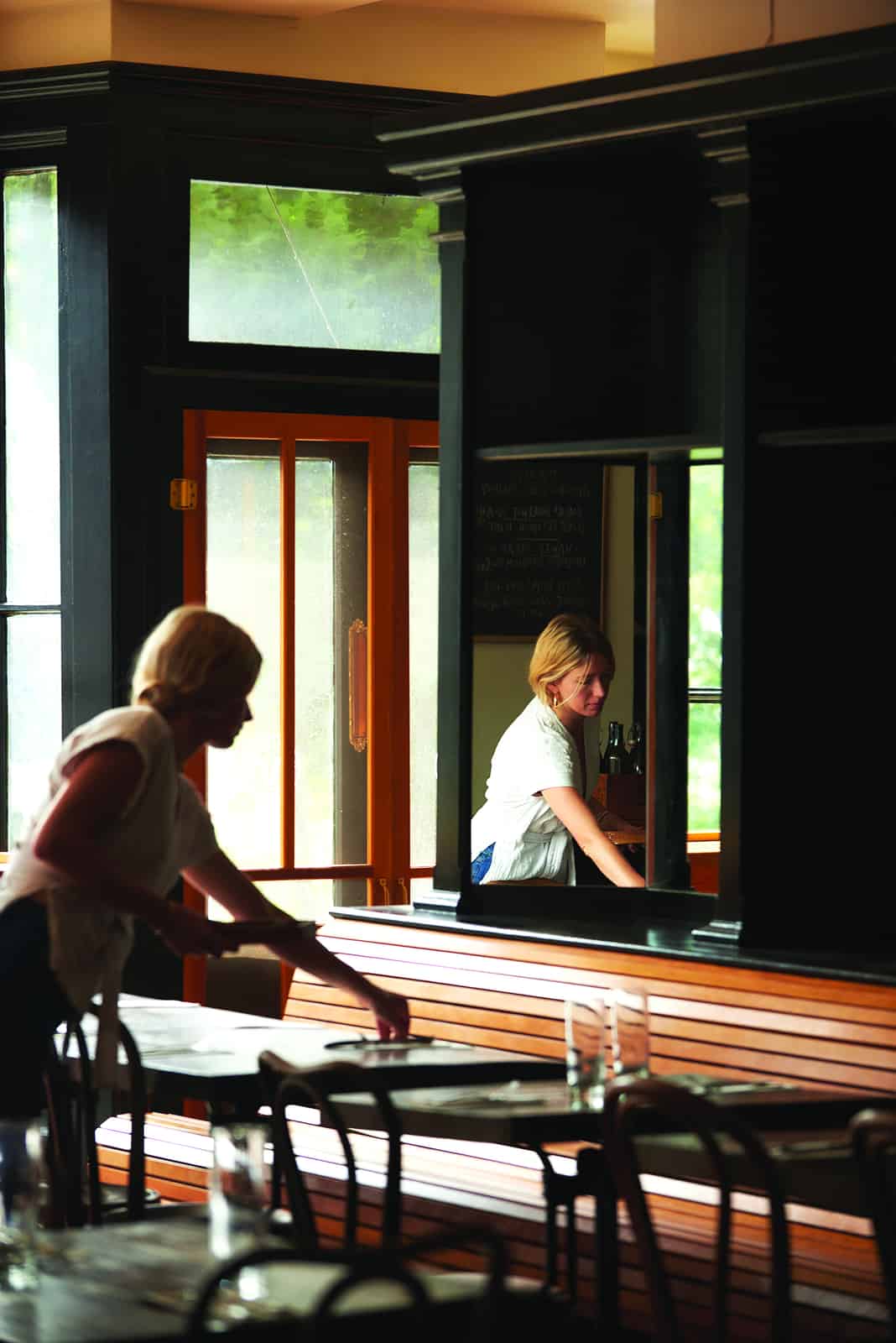
Brushland Eating House, NY. Co-owner Sara Elbert setting up the dining room. Photo by Jennifer May. www.jennifermay.com
Despite a smooth opening, maintaining a restaurant in an intimate environment can be challenging, Zandi admits. “Being one of only a handful of dining options, your guests are really very much in charge. We can have the best-tasting, most lovely-looking food, but if the people that come to eat don’t understand or like it, you’re in trouble.”
On the menu, Zandi utilizes seasonal ingredients and leans on local farms and purveyors. “In Manhattan, you can open a restaurant that only serves almond flour pancakes topped with candied roses, and guaranteed there will be a thousand people who eat there a day, [since New York has a] widely varied population. Here, you have to have something for everybody.” That might be a challenge for some chefs, Zandi says, but “much of what we like to eat—and subsequently like to cook—is comforting and simple.”

Brushland Eating House, NY. Chef Sohail Zandi making hand-rolled ricotta pasta. Photo by Jennifer May. www.jennifermay.com
When creating a dish, Zandi says he and Elbert are inspired by something—an in-season vegetable, for example—and then it’s all about creating balance around that ingredient. “Cheese is a pretty common component,” Zandi says. The couple uses lots of hard cheeses—anything “dry and earthy”—as well as softer varieties like Stilton-style blues and ricotta. When possible, they go local, tapping nearby dairy farms and creameries for products. “Good food reminds you of a time and place, and I think cheese in particular has that power,” Zandi says.
Ultimately, Zandi and Elbert have found a home for themselves and their restaurant in Bovina. They also operate a small, on-site seasonal shop, The Huddle, in which they sell sauces and condiments they make in house.
“With a small, tight-knit community like ours, it’s important that everyone carries their weight, participates, and loves the town,” says Zandi. “And people here do. We love feeling so neighborly and looked after.”
Read on for top recipes from Brushland Eating House.
Cauliflower Sandwich with Broccoli Rabe Pecorino Pesto

Brushland Eating House, NY. Cauliflower Sandwith with Broccoli Rabe Pecorino Pesto. Photo by Jennifer May. www.jennifermay.com
Seasoned Ricotta with Pomegranate Seeds, Persimmon, and Balsamic
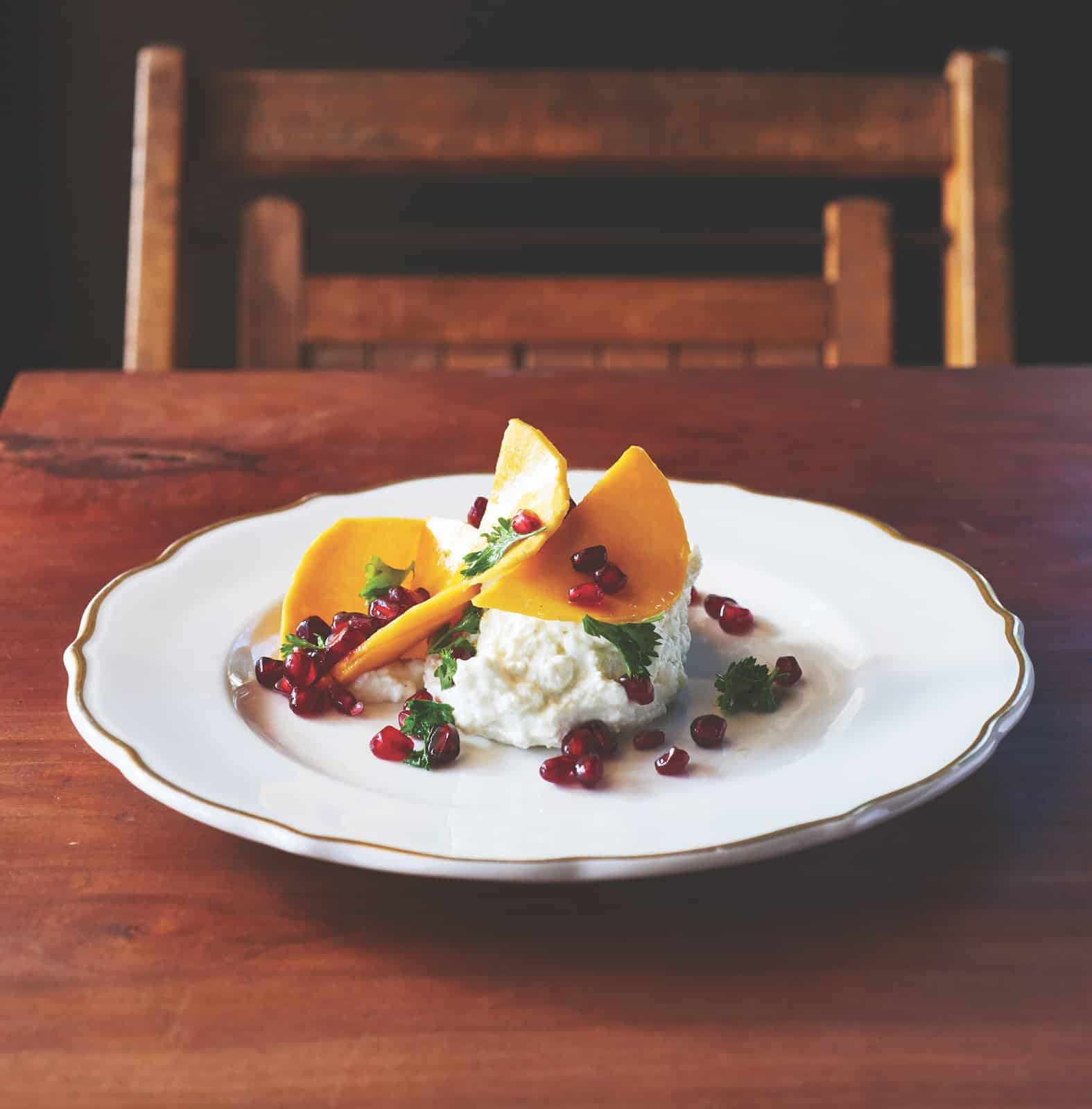
Brushland Eating House, NY. Seasoned Ricotta with Pomegranate Seeds, Persimmons and Balsamic. Photo by Jennifer May. www.jennifermay.com
Hand Rolled Ricotta Pasta with Brushland’s Grandma Sauce
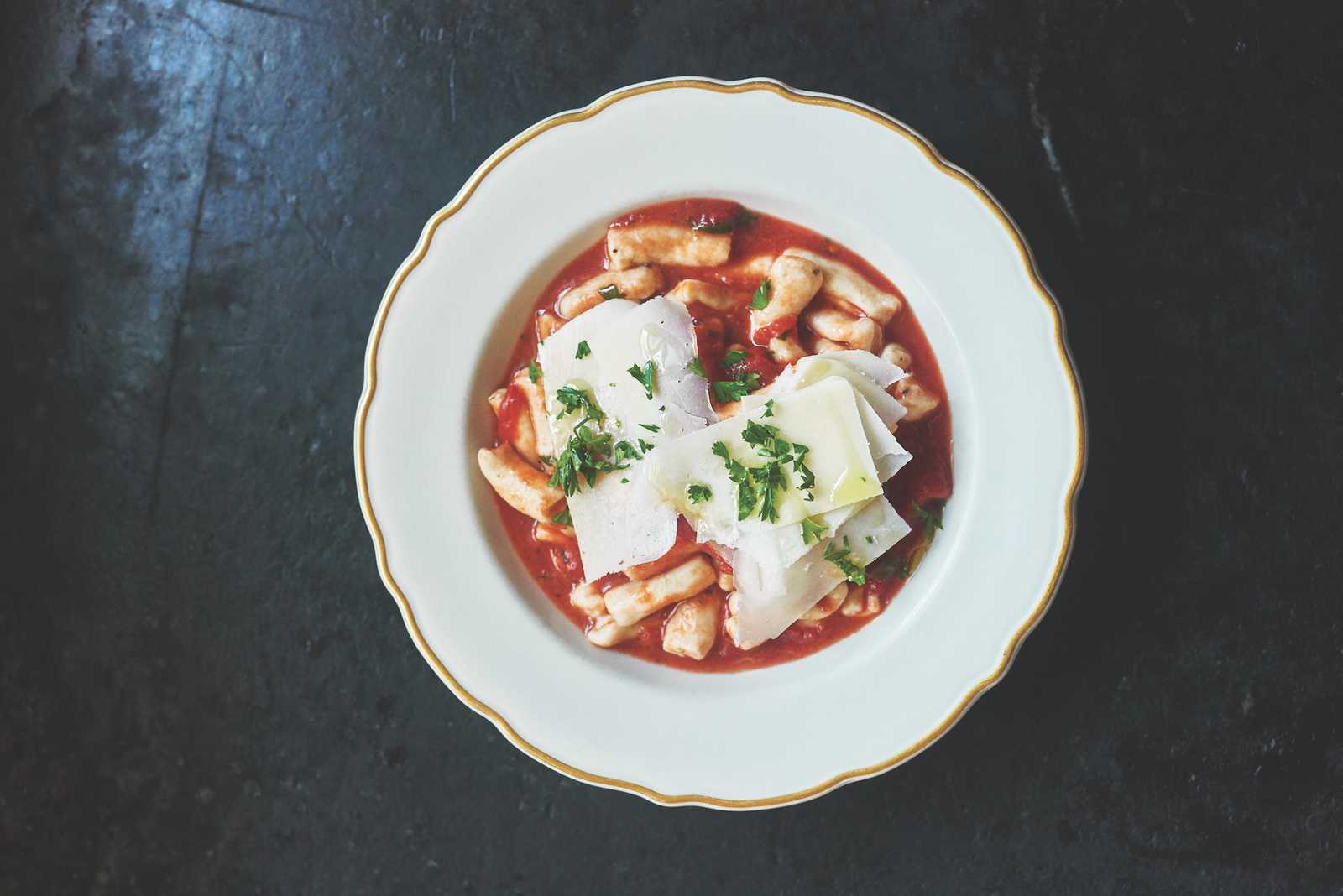
Brushland Eating House, NY. Hand-Rolled Ricotta Pasta with Brushland’s Grandma Sauce. Photo by Jennifer May. www.jennifermay.com
Chopped Kale Salad with Crushed Hazelnuts, Aged Gouda, and Spicy Anchovy Dressing

Brushland Eating House, NY. Chopped Kale Salad with Crushed Hazelnuts, Aged Gouda and Spicy Anchovy Dressing. Photo by Jennifer May. www.jennifermay.com
Marinated Hangar Steak with Feta Vinaigrette
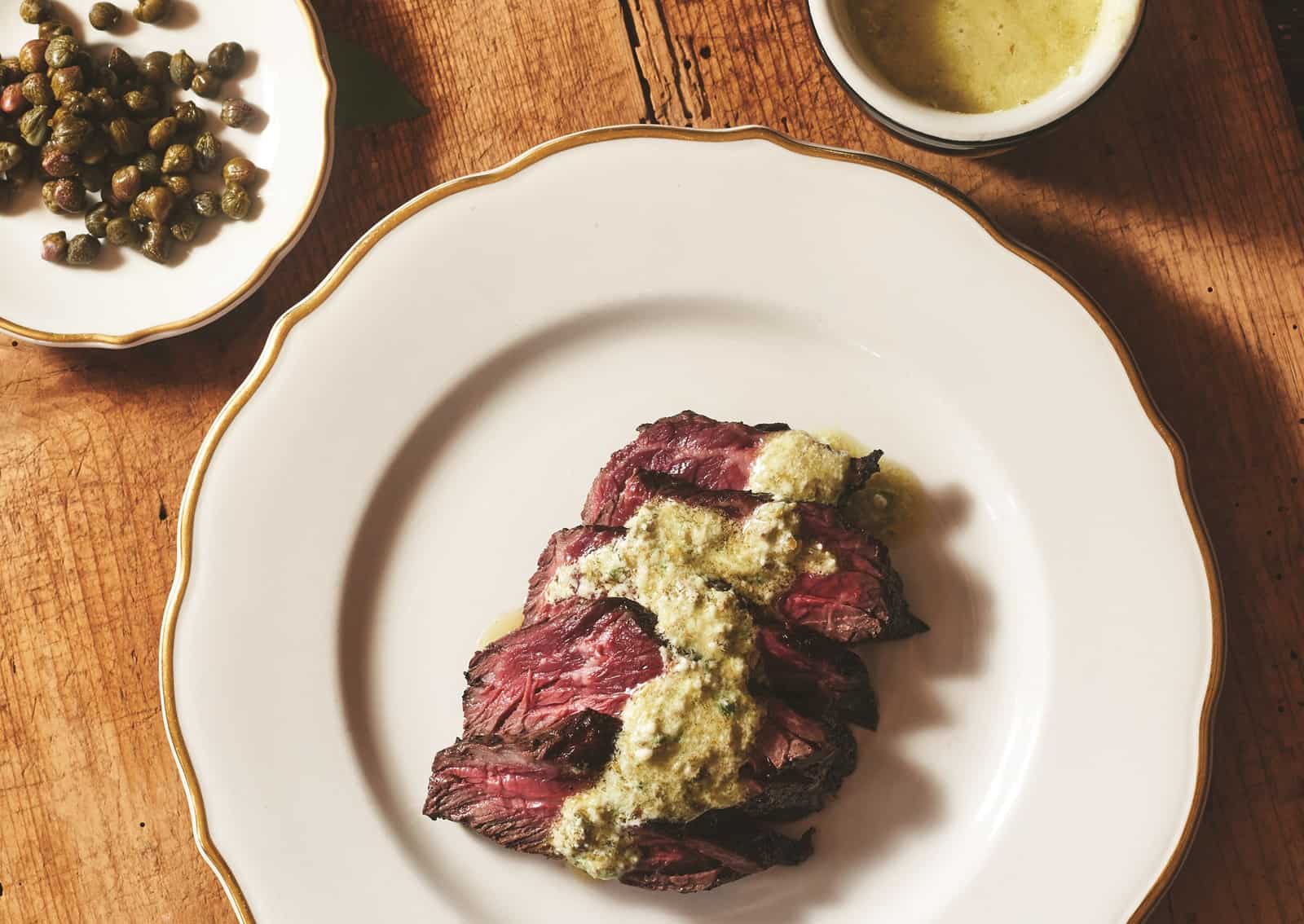
Brushland Eating House, NY. Marinated Hangar Steak with Feta Dressing. Photo by Jennifer May. www.jennifermay.com
Photography by Jennifer May




